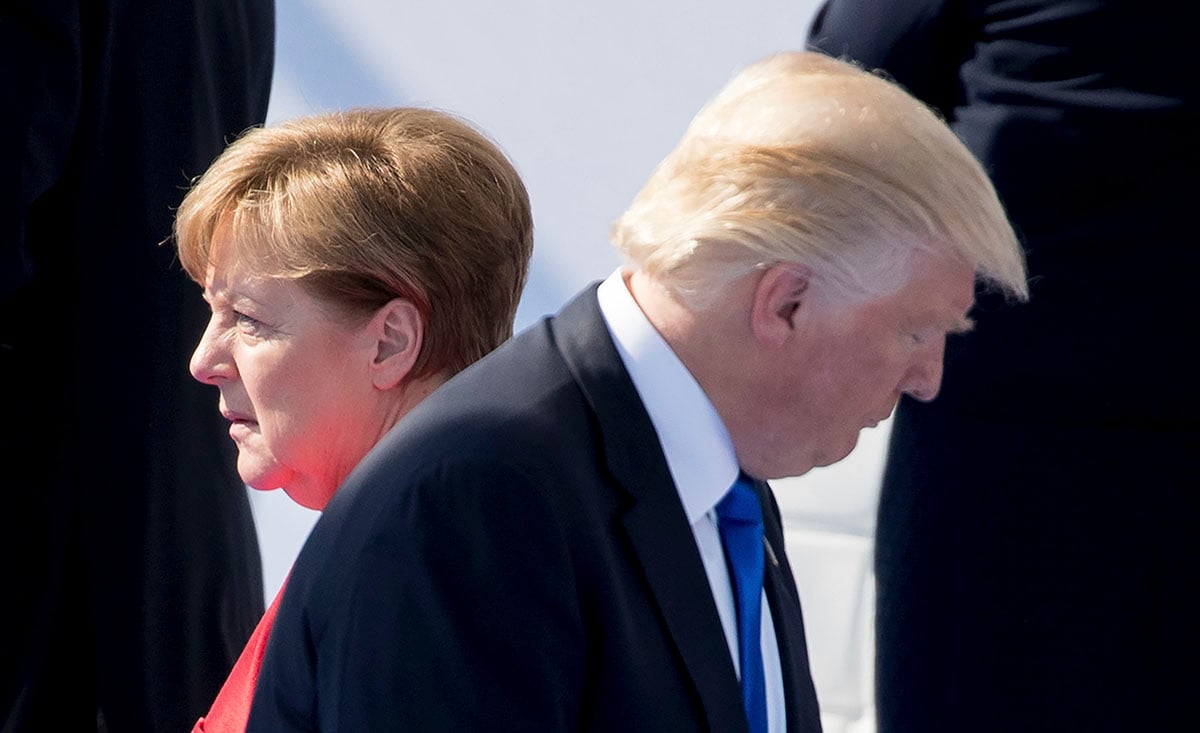Germany Sees U.S. as Unreliable
German Chancellor Angela Merkel expressed her frustration with the U.S. and the U.K. this week. Will NATO survive the growing divisions?
German Chancellor Angela Merkel walks by U.S. President Donald Trump at the recent NATO summit in Brussels (May 25, 2017). 
These sobering words, signaling a growing rift between two of the great powers of the 21st century, quickly reverberated around the world. But at the political rally in a beer tent in Munich where they were spoken, the crowd welcomed them with a minute-long applause.
According to The Economist, “Seen from here [Germany], Mr Trump’s America looks straightforwardly ugly and almost congenitally volatile. … Meanwhile Britain’s departure from EU is seen here as a regretfully unambiguous retreat from the world stage.”
How did these staunch allies of many decades get to this point?
Winds of change in the North Atlantic
Germany has been firmly in the Western camp since rejecting a 1952 Soviet offer of reunification that would have required it to stay out of the North Atlantic Treaty Organization (NATO). Instead, Germany joined NATO in 1955, and the Soviet Union eventually lost the expensive Cold War, leading to its collapse in 1991. As former East Bloc nations and Soviet Republics joined NATO, a wary Russia has worked desperately to weaken NATO in any way it could.
Signs of weakening of the alliance could be seen in the differences between Germany and the United States over managing the breakup of Yugoslavia and over the Iraq war in 2003.
Reports of U.S. tapping of Angela Merkel’s phone didn’t help, and now the perceived U.S. reluctance to fully commit to protect its NATO partners is making the divide more pronounced than ever. During a recent speech in Brussels, President Donald Trump didn’t explicitly affirm his support for NATO’s Article 5 collective defense clause (that an attack on one member is considered an attack on all), which sparked alarm in Europe. Germany in particular has not taken kindly to U.S. accusations about unfair trade practices and unpaid debts to NATO.
European arms
Ironically, Germany may decide it is time to increase its military expenditures, but within a European framework rather than a North Atlantic one.
The Economist noted that Chancellor Merkel’s words emphasized that she is “keenly European but that the country cannot afford to depend indefinitely on the military shield of wayward Anglo-Saxon allies.”
Germany may decide it is time to increase its military expenditures, but within a European framework rather than a North Atlantic one.
EU leaders continue discussing further European defense and security coordination, which could eventually lead to a European army. Such an army has long been blocked by the United Kingdom, but with Brexit, this impediment will soon be gone.
According to the EU Observer, defense plans include “joint arms procurement and making EU ‘battlegroups’ more ready to intervene in conflicts in Africa and the Middle East.
“‘A European army is not a project for the near future,’ Commission head Jean-Claude Juncker told Salzburger Nachrichten, an Austrian newspaper, on Saturday.
“‘It is, however, a project that would give additional weight to the European foreign and security policy. Even though the road may still be long, we could already focus our strengths better,’ he said.”
In today’s fast-paced and chaotic world order, changes can occur much faster than anticipated. Will the U.S. someday regret pushing Europe to increase military spending? See more background in our 2015 blog post “Is a European Army on the Horizon?”
An alliance, not a family
The North Atlantic Treaty Organization first served as a bulwark against Soviet threats, then continued as a cornerstone of Western security. But the 28 member nations do not see eye to eye on many issues, and chinks have appeared in the armor of the alliance.
In his article in The Atlantic, David Frum gave this anecdote to show that some in Germany still do not trust the nations that defeated them in World War II: “‘We will never be family,’ a semi-inebriated German Air Force general once insisted to me at a NATO conference in Tallinn. ‘Americans, British, Canadians, Australians, New Zealanders: You are family. We will never be.’”
Will the alliance continue? Will statements made during the U.S. presidential campaign about NATO’s obsolescence prove prophetic?
Biblical prophecy indicates an end-time split between a German-led European power and the Anglo-American family of nations. You can read more about this in our articles “All Roads Lead to Berlin” and “Who Are the United States and Britain in Prophecy?”
Date Posted: May 31, 2017

 by Mike Bennett
by Mike Bennett

